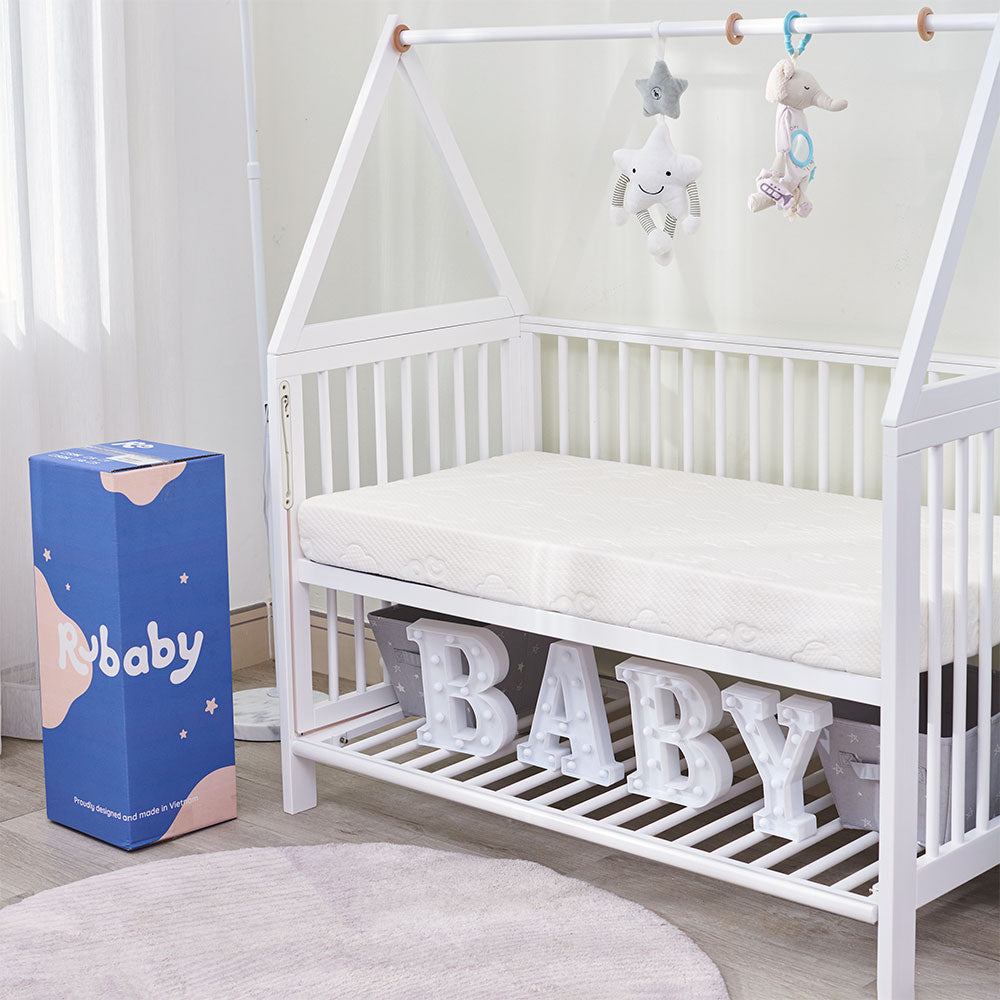Foam materials are one of the most popular choices today thanks to the special benefits they bring. Read on to find out what foam is and why it's so popular!
Foam materials have many different types: memory foam, pu foam, eva foam… Foam has many applications in the sleep industry, especially mattresses. Join Ru9 to learn more about this material and the applications around it.
1. What is the foam material?
Foam, also known as sponge or sponge, is usually made from low-density elastomers, plastics, and other materials of varying porosity. Foam materials are used in many architectural, industrial, medical and consumer applications.

Foam material is one of the most popular and commonly used materials on the market today.
Open cell foams with interconnected pores or cells, suitable for filtration applications. Closed-cell foam has no interlocking holes or cells, but is useful for floating applications. Flexible foam foam can bend, flex or absorb impacts without cracking or delaminating. The mesh foams have a very open structure with thin fibers creating an interconnected matrix network.
Advantages of foam material
Support buffering capabilities
The most important advantage of foam material is that it provides good cushioning and protection compared to other hard wood and plastic materials. Foam is a lightweight, yet highly resilient material that makes them ideal for providing supportive cushioning to other products. Simply put, when it comes to shipping, any package is susceptible to many different types of impacts. At this time, the foam will be effective in reducing impacts such as compression, vibration and impact.
Waterproof and moisture-proof
Technically, the advantage of waterproofing lies only in foams such as EVA, PE, PVC Nitrile, EPP or foam rubber materials. Because they often have a closed-cell foam structure, these foams do not absorb water and can resist moisture.

EVA Foam is quite waterproof, used in yoga mat products.
Like impact resistance, the property of foam materials is that it is extremely resistant to chemicals and oils. Allowing them to remain stable in oil and water, if you are looking for an elastomer for use in marine applications, then foam is the perfect choice for you.
Outstanding thermal and electrical insulation performance
There are many reasons why foam has become one of the most popular materials on the market. In particular, has excellent temperature regulation and insulation ability, so it is widely used in industries such as construction, construction, transportation, automobile and many others.
Sound insulation and noise reduction
In many cases, foam provides excellent sound insulation and noise reduction. This is considered one of the best properties of this material, they easily avoid all annoying noises from the outside and rest assured that nothing will bother you.
Durable
When choosing to buy products made from foam, you can be assured of the longevity compared to the price paid. Foam usually does not deform or flatten or sink over time, and at the same time keeps its original shape intact.

One of the obvious advantages of Foam material is its high durability and long service life.
Disadvantages of foam material
Relatively high price
High performance foam materials are generally more expensive to manufacture than lower density foams. However, when you compare all the advantages of foam, the downside in price becomes insignificant.
Limit contact with water
Although many types of foam are good at waterproofing, there are still many types that need certain restrictions when exposed to water to ensure durability. This foam material usually takes longer to dry after being exposed to water.
2. Popular types of foam
PU foam material
PU foam is a synthetic foam from polyol and diisocyanate in the ratio 2:1. This type of foam has wide pores and a more open cell structure, which is both an advantage and a disadvantage. PU foam enhances and regulates temperature distribution, but at the same time can also be a body heat retention factor.
EVA foam material
Eva foam is made from a mixture of ethylene and vinyl acetate, where the weight percentage of vinyl acetate typically ranges from 10 to 40%.
EVA foam material has a closed foam structure with many excellent performances including good water and moisture resistance, shock resistance, heat insulation and long-term durability. They are widely used in products such as shoe soles, yoga mats, foam packaging, swimming skates, floor linings, etc.
Memory foam material
The origin of memory foam is that it was developed by NASA in the early 1960s to make airplane seats. But now, this material is found in many different products, from pillows, shoes, mattresses, office furniture, etc.

Memory foam mattress is one of the most popular and preferred foam material applications.
The main component of memory foam is a polyurethane polymer with elasticity and even pressure distribution. Therefore, one of the most common uses of this material is as a mattress, which provides a comfortable and supportive sleeping surface.
3. Common foam applications
Clothes
With the advantage of good sweat absorption, the Polyurethane component in the Foam material is often used in clothing production. Especially popular in the products of clothing pads, sports accessories and high-stretch apparel.
Building materials
Thanks to good sound and heat insulation, foam has become a building material that many people trust. In addition, they are also lightweight, durable and affordable materials.
Activated foam mattress
With a quality memory foam mattress, you will easily fall asleep and feel comfortable when you wake up. Especially memory foam mattresses, they actively mold to hug the body shape and evenly distribute the weight so as not to create pressure when lying down.

Ru9 foam mattress uses high performance foam technology to create great benefits for sleep.
For easy visualization, you can refer to the Original Ru9 mattress with 3 layers of support foam. Composed of millions of air particles connected together with an open structure, the Ru9 mattress is breathable, keeping you asleep in all weathers. At the same time, the Memory Foam layer helps the body not bear any reaction when lying down, for a smooth and comfortable sleep. Finally, the exclusive Ru9 Contour Foam top layer has the highest density, providing elasticity, supporting the body and spine in a natural curve all night long.
In summary, through the basic information about what Foam material is above, you have had an overview as well as appropriate considerations in choosing foam materials to meet your needs.






















































